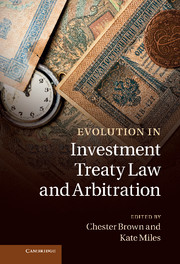Book contents
- Frontmatter
- Contents
- Contributors
- Editors' preface and acknowledgements
- Table of cases
- Table of Treaties
- Part I Introduction
- Part II Shifts in fundamental character
- Part III Actors in international investment law
- Part IV The new significance of procedure
- Part V Engagement with cross-cutting issues
- 21 Protecting intellectual property rights under BITs, FTAs and TRIPS: Conflicting regimes or mutual coherence?
- 22 Stabilisation clauses and sustainable development: Drafting for the future
- 23 A new investment deal in Asia and Africa: Land leases to foreign investors
- 24 Thirst for profit: Water privatisation, investment law and a human right to water
- 25 Economic development at the core of the international investment regime
- 26 Regulatory chill and the threat of arbitration: A view from political science
- Part VI Conclusions
- Index
- References
23 - A new investment deal in Asia and Africa: Land leases to foreign investors
from Part V - Engagement with cross-cutting issues
Published online by Cambridge University Press: 05 December 2011
- Frontmatter
- Contents
- Contributors
- Editors' preface and acknowledgements
- Table of cases
- Table of Treaties
- Part I Introduction
- Part II Shifts in fundamental character
- Part III Actors in international investment law
- Part IV The new significance of procedure
- Part V Engagement with cross-cutting issues
- 21 Protecting intellectual property rights under BITs, FTAs and TRIPS: Conflicting regimes or mutual coherence?
- 22 Stabilisation clauses and sustainable development: Drafting for the future
- 23 A new investment deal in Asia and Africa: Land leases to foreign investors
- 24 Thirst for profit: Water privatisation, investment law and a human right to water
- 25 Economic development at the core of the international investment regime
- 26 Regulatory chill and the threat of arbitration: A view from political science
- Part VI Conclusions
- Index
- References
Summary
Introduction
In the last decade, Ethiopia has made a concerted effort to attract foreign direct investment. The website for the Ethiopian Investment Commission, a federal government agency tasked with promoting Ethiopia as an investment destination, boasts of Ethiopia's ‘abundant natural resources: such as land, water, minerals, and population of over 70 million potential consumers’. While Ethiopia touts the availability of surplus lands for investors and offers investment incentives such as exemption from export custom duties, the United Nations World Food Programme provided food to 10 million individuals in 2009 and expected to provide food to 9.5 million individuals in 2010.
‘Free investment’, like ‘free trade’, has been embraced as a panacea for States lagging behind in the world economy. Yet as the idea of ‘free investment’ follows ‘free trade’, citizens in many of the poorest States are increasingly emerging on the losing end of the globalisation spectrum. It seems that in spite of global rhetoric of ‘raising the floor’ for all citizens, ‘free investment’ policies and the laws that support these policies may in fact hurt the very communities the investment is putatively intended to help.
- Type
- Chapter
- Information
- Evolution in Investment Treaty Law and Arbitration , pp. 539 - 569Publisher: Cambridge University PressPrint publication year: 2011

